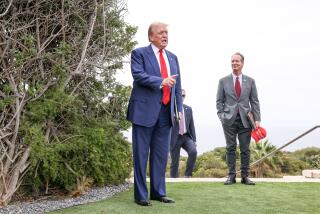Cruz outmaneuvering Trump in behind-the-scenes battles for delegates
Reporting from Colorado Springs, Colo. — David Coonradt came to the Colorado state Republican convention as part of Ted Cruz’s “persuasion team,” a squad of volunteers working to secure more delegates to propel Cruz to the party’s presidential nomination.
He came ready to tout the Texas senator’s gun-rights and antiabortion credentials, but the most crucial information he had to impart appeared on the back of his neon orange T-shirt.
“The official Ted Cruz slate,” the shirt blared, with the names of 13 prospective delegates below.
More than 600 people were vying Saturday for 13 delegate slots for the Republican National Convention in July. The Cruz campaign wanted to ensure these loyal 13 secured those spots. Turning their volunteers into walking billboards was just one way to do so.
Donald Trump has won more votes and carried more states than any Republican. Still, he stands a fair chance of losing the GOP nomination because up to now he largely ignored one of the most rudimentary aspects of a presidential run: securing loyal delegates.
In state after state in recent weeks, the Cruz campaign has trounced Trump in those battles, building on work to identify and organize supporters that Cruz began months ago. Those successes are improving Cruz’s odds of emerging as the Republican nominee if Trump falls short of winning a majority of delegates.
“You have to think of this whole process as having two different tracks to it. There’s the primary process — that’s about winning and allocating delegates,” said Ben Ginsberg, a veteran Republican election lawyer.
But “the story that will really be more important to what happens in Cleveland,” he said, “is the delegate-selection track. They’re two connected but separate skill sets.”
Belatedly, Trump has scrambled to remedy his campaign’s shortcomings. Last week, he designated a longtime Washington insider, Paul J. Manafort, to oversee efforts to ensure that Trump has the 1,237 delegates needed to clinch the nomination.
“The nomination process has reached a point that requires someone familiar with the complexities involved in the final stages,” Trump said in a statement announcing Manafort’s expanded role just over a week after he joined the campaign.
For decades, no one has cared much about the often arcane process by which political parties choose delegates who attend their national conventions. The system has worked like this: Voters cast ballots in primaries and caucuses, one candidate wins a majority, and the convention unfolds as a largely suspense-free television program.
The most vexing choices for many delegates have been which party to attend and whether to wear a silly hat.
That’s all changed this year. As odds have increased that no Republican candidate will win enough delegates before the convention in Cleveland, campaigns have engaged in tense battles over the individuals who will vote in the convention roll call. Many delegates will be free to vote for whichever candidate they choose if no one wins on the first ballot.
In most states, national convention delegates are chosen separately from the primaries or caucuses in which voters say which candidates they prefer. Typically, the selection occurs at state or district conventions.
The results of a state primary generally bind those delegates to support a specific candidate on the convention’s first ballot. But if no candidate wins on that first ballot, most states allow their delegates to be “unbound.” Some states bind their delegates for only one ballot, others for two or more.
In the race to choose delegates, Trump’s campaign has been criticized as flat-footed. After he won the Louisiana primary, the New York businessman cried foul when Cruz supporters seized some delegates through subsequent party meetings. Trump bemoaned the maneuvering as “unfair.” His campaign threatened to challenge the delegate process in that state, where Cruz placed his loyalists in many delegate slots.
In Reno seven days earlier, when the county’s Republicans gathered to choose delegates to next month’s Nevada state convention — which, in turn, will choose the national convention delegates — the Trump campaign had a much more visible presence than Cruz’s.
A Trump staffer was assiduously collecting names and phone numbers of supporters headed to the state convention, compiling the list on a yellow legal pad. But Cruz’s campaign had aides there as well, diligently tracking which of their ardent backers were seeking Nevada delegate slots.
Ohio Gov. John Kasich, who lags far behind in the GOP race, with 143 delegates to Trump’s 743 and Cruz’s 532, is also pursuing friendly delegates. Emmalee Kalmbach, a spokeswoman for Kasich’s campaign, said dozens of staffers and “many more volunteers” were in the delegate hunt.
This usually invisible process is playing out in increasingly public fashion. The Republican National Committee has put out videos and websites breaking down the delegate rules. Cruz, in a victory speech after his win in Wisconsin this month, asserted he’d clinch the nomination “either before Cleveland, or at the convention in Cleveland.”
The machinations will matter if Trump fails to win a majority of delegates by the time California’s votes are counted on June 7, the final day of the GOP primary season.
Identifying and wooing potential delegates and getting supporters elected to delegate slots is no simple task. An intricate patchwork of rules governs the process, and they vary wildly by state.
Delegates can make their favorite candidate known, but they’re not necessarily required to. Campaigns can identify which delegates they prefer and encourage their supporters to vote for a slate of friendly delegates.
“It’s not an inconsiderable organizational drill to make sure you have loyal delegates,” said Mike Schroeder, California political director for the Cruz campaign. The former state GOP chairman conceived the complicated rules for awarding presidential delegates in the state’s primary, positioning the Cruz operation well in California’s delegate hunt.
The delegate selection process in Colorado is “confusing, it is complicated, it is archaic,” said Ryan Call, a former Colorado GOP chairman.
The bulk of Colorado’s 37 delegates were selected at congressional-district-level gatherings in the last week. Early Saturday, Cruz boasted that “together, we won all 21” delegates in those meetings. By evening, he scooped up 13 more. Three other delegate positions will go to party officials.
Lobbying for those coveted delegate positions was robust. Barry Rabinovich, 25, a Cruz supporter who was not on the campaign’s official slate, made his pitch to convention-goers waiting in line for coffee, promising to vote for Cruz “on every round of the ballot” and trumpeting the three-digit number where attendees could find him on the ballot.
The Trump camp, meanwhile, suffered from unforced errors, such as distributed leaflets that incorrectly stated where their preferred delegate candidates would appear on the ballot.
The Trump campaign had a presence at the convention, but operatives were bracing for a rout.
“This process just doesn’t work well for our kind of candidate and our kind of campaign,” said Alan Cobb, a Trump senior advisor. “It’s an insider’s game. Sen. Cruz is certainly good at playing the insider game.”
Laura Carno, a Republican strategist, said the Texas senator’s team had built relationships with local activists.
“The way the Cruz campaign seems to have picked their ground-game people gives me confidence they actually know Colorado,” said Carno, who fielded so many phone calls from campaigns and supporters in the run-up to the conventions that she stopped answering calls from numbers she didn’t recognize.
Some Trump supporters, however, see the delegate machinations as proof that the Republican establishment is conspiring against the billionaire real estate developer.
“The Cruz people are trying to steal this,” Jacquelyn Marcelle, a Reno-based Trump backer, said during the Washoe County party meeting. The maneuvering has only bolstered her support for Trump — and distaste for Cruz, she said.
“Why would I vote for a thief?” she asked.
But the Cruz campaign dismissed the notion it was doing anything untoward.
“There’s a theme throughout the Trump campaign: The minute they lose, they start screaming ‘Liar! Cheater!’” Schroeder said. “These are the rules. It’s not very complicated.”
Mason reported from Colorado Springs and Barabak from San Francisco.
For more on Campaign 2016, follow @MelMason
ALSO
With Trump’s rise, big donors and companies hesitate to commit money to the GOP convention
Smoke-filled room, meet Silicon Valley: Techies see opportunity at GOP convention
More to Read
Get the L.A. Times Politics newsletter
Deeply reported insights into legislation, politics and policy from Sacramento, Washington and beyond. In your inbox three times per week.
You may occasionally receive promotional content from the Los Angeles Times.












